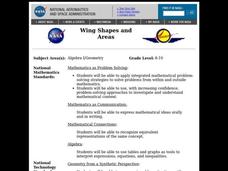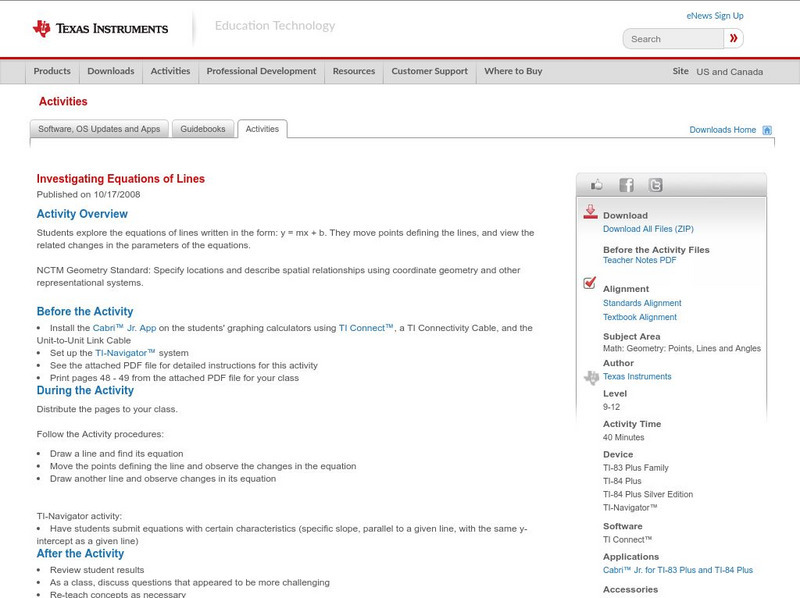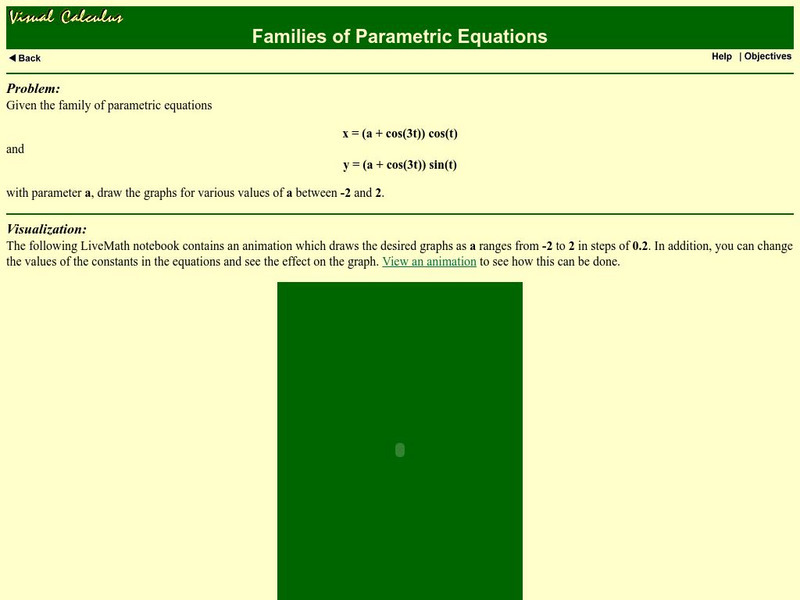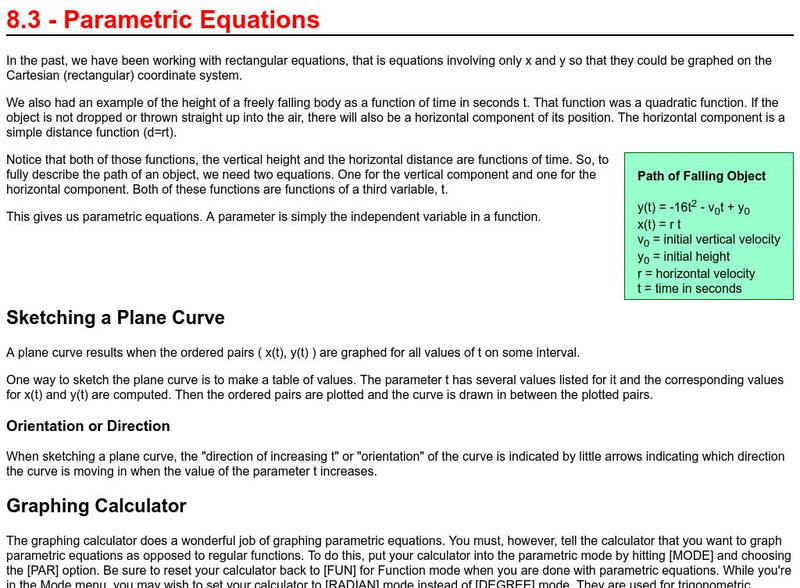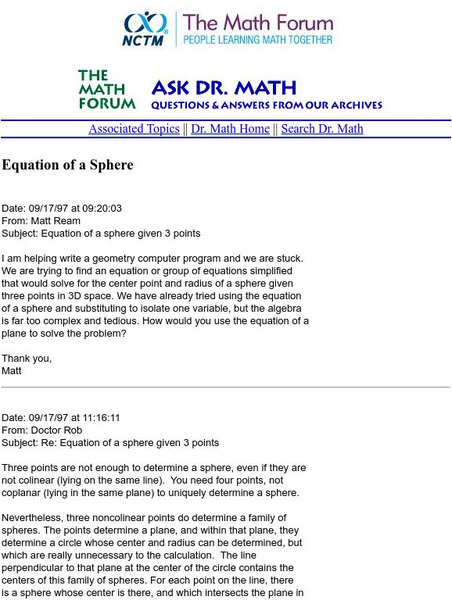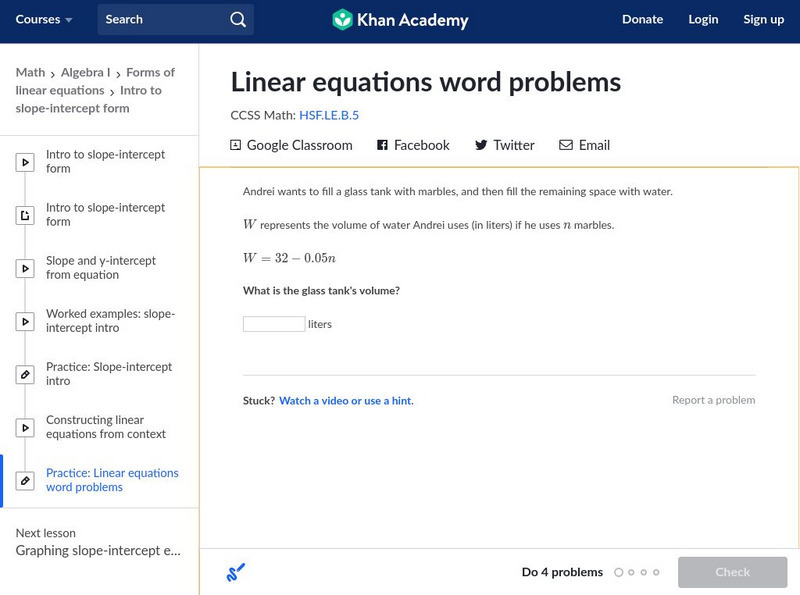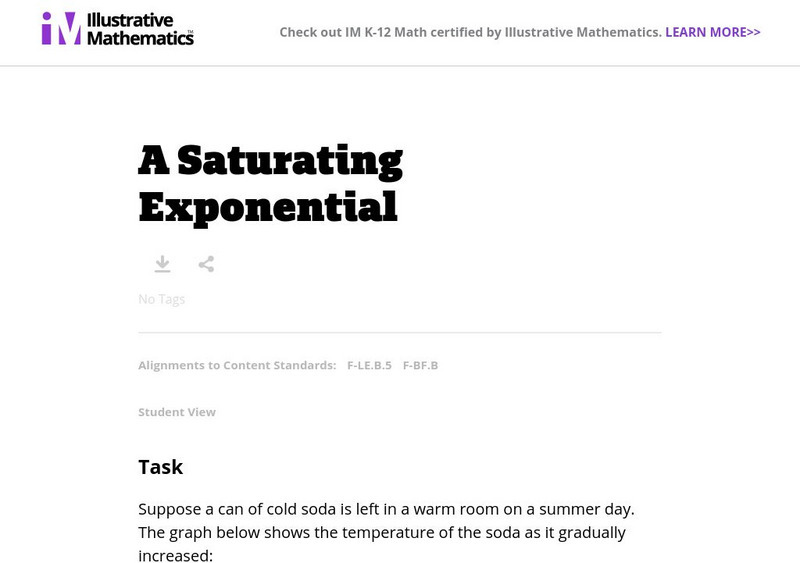Curated OER
The Baseball and Air
Students use Curveball to complete the activity to determine how the speed of airstreams changes in relation to changes in the distance of the airstream from the center of the baseball.
Curated OER
Wing Shapes and Areas
Students, after reading the explanation given below, use FoilSim to determine the weight of the aircraft that can be lifted by a pair of wings of each type. They also design a unique platform of a wing to lift a plane weighing 11500 pounds.
Curated OER
Mass & Velocity Effect
Students, after reading the explanation given below, use FoilSim to complete the activity to fulfill the specifications of a given airfoil and then plot and interpret graphs.
Curated OER
Wing Specifications
Ninth graders use FoilSim to fulfill the specifications of a given airfoil (wing) and plot and interpret graphs.
Curated OER
Wing Area Effects Problem Set
High schoolers read an explanation from a NASA Web-based textbook on lift and an explanation on the FoilSim software package given below. They use FoilSim to evaluate the relationship between wing area and lift.
Curated OER
Velocity Effects Problem Set
Students, after reading an explanation on lift from a NASA Web-based textbook and an explanation on the FoilSim software package given below, use FoilSim to evaluate the relationship between velocity and lift.
Curated OER
Growing a Garden
Students research aspects of gardening including nutrition, costs, and soil preparation. They then write a report detailing the planning of the garden and compare costs to buying the items.
Curated OER
Rotation Sensor Challenge
Students participate in a challenge to construct a rotation sensor with the highest degree of accuracy and repeatability. They conduct computer analysis of their sensor using repeated trial.
Curated OER
Water: On the Surface and in the Ground
Students explore the differences between surface water and ground water. They collect data using maps and graphs and investigate a Texas river basin and a nearby aquifer. They complete a written report including maps and data regarding...
Curated OER
Water-Is There Going to be Enough?
High schoolers research the availability, usage and demand for water in the local area historically and use projections of the availability, usage and demand for water up to the year 2050. They gather data and present the information in...
Curated OER
Addition To Fifteen
In this math worksheet, students solve problems using the operation of addition to find the sums. The sheet is a teacher's guide.
Curated OER
Addition To One Hundred
For this math worksheet, students use the worksheets that are created by
the teacher using Adobe Reader. The sheet is a users guide.
Texas Instruments
Texas Instruments: Investigating Equations of Lines
In this activity, students explore the equations of lines written in the form: y = mx + b. They move points defining the lines, and view the related changes in the parameters of the equations.
Math Medics
S.o.s. Math: Method of Variation of Parameters
This lesson shows how to solve a nonhomogeneous second order linear equation using variation of parameters and the Wronskian method.
Mathematics Archives
Math Archives: Visual Calculus: Families of Parametric Equations
This site gives an example of parametric equations. The site also gives an animation of how the curve is drawn. Requires the use of Live-Math plug-in, which is free.
Physics Aviary
Physics Aviary: Equations of Motion Lab
You will be adjusting different parameters, such as speed and time accelerating, in this lab to see how they affect the motion of your car. Record the data and then reset your system to make desired changes.
Richland Community College
Richland Community College: Parametric Equations
This is a discussion of how to graph parametric equations, how to enter them into your calculator, and how to eliminate the parameter. The site has examples to help clarify the concept of eliminating the parameter.
National Council of Teachers of Mathematics
The Math Forum: Ask Dr. Math: Equation of a Sphere
Learn about how many points determine a unique sphere and how many points are needed to create a family of spheres. Dr. Rob works out the equation of a family of spheres given three points and then the equation of a unique sphere can be...
Illustrative Mathematics
Illustrative Mathematics: F Le Newton's Law of Cooling
For this problem, students use an exponential equation to investigate the cooling of a cup of coffee and how long it would take for it to cool down to different temperatures. Aligns with F-LE.B.5 and F-LE.A.4.
Khan Academy
Khan Academy: Algebra I: Linear Equations Word Problems
Solve word problems about real world relationships that are given in formulas. Students receive immediate feedback and have the opportunity to try questions repeatedly, watch a video or receive hints.
Khan Academy
Khan Academy: Linear Models Word Problems
Solve general word problems about real-world relationships that can be modeled by linear equations or functions. Students receive immediate feedback and have the opportunity to try questions repeatedly, watch a video, or receive hints.
Georgia State University
Georgia State University: Hyper Physics: Wave Motion
Two wave graphs depicting a sine wave and relating the various characteristics (wavelength, amplitude, frequency, and period) of a wave to each other. The site includes an interactive JavaScript form in which the visitor enters one...
Illustrative Mathematics
Illustrative Mathematics: F Le a Saturating Exponential
For this problem, students use an exponential equation to investigate the warming up of a cold beverage on a summer day and analyze a graph to estimate temperatures. Aligns with F-LE.B.5 and F-BF.B.
Texas Instruments
Texas Instruments: Transformation Graphing App
This App helps students improve graphing comprehension. They input functions, view visual diagrams of functions, and observe changes in the function as the parameters change.



